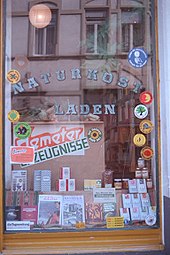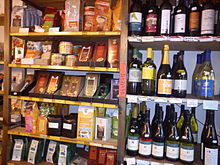Health food store
A health food store (also: natural food store ) is a grocery store whose products for sale come from organic farming and environmentally friendly processing. In addition to food, where the focus is on natural food , personal care and cleaning products, clothing and other everyday products are often offered - essential aspects are the lowest possible pollution of the goods offered and their environmentally friendly production. Almost all of the food comes from organic farming. Conventionally grown food is almost never sold in health food stores; if so, they are usually marked. Genetically modified foods cannot be found in health food stores.
history
1970s
In the early 1970s, organic shops opened up in large cities. The first German health food store was “Peace Food”, which opened in Berlin in 1971 and was run by Ramon and Anchala Markus and was taken over by the yoga organization Ananda Marga in the mid-1970s . Within the decade, the number of stores grew into the three-digit range. The first wholesaler existed as early as 1975, and from 1979 regional distribution cooperatives . During this time, organic shops mainly sold traditionally produced vegetarian foods, which customers often had to fill themselves from sacks or boxes. There was also a range of goods associated with an alternative lifestyle: candles, incense sticks , henna , environmental paper , books and brochures. A core product of this time was the self-mixed muesli . In the course of the 1970s, the organic shops developed into communicative meeting places that supported the grassroots work of various political groups and citizens' initiatives as multipliers.
1980s
After the number of shops had grown to over 1,000 sales outlets, numerous owners concentrated on working more efficiently and improving their appearance. As a result, the shops were increasingly opening up to normal customers. The scene tried to present itself as an industry through mergers and to work together in the procurement of goods, training and public relations. The first quality controls of the organic products were also jointly organized. This resulted in the Bundesverband Naturkost eV representing the interests of the retail trade, which was converted into the Bundesverband Naturkost Naturwarenhandel eV in 1988 . In the same year the Federal Association of Natural Food and Natural Goods Wholesalers eV , the forerunner of today's Federal Association of Natural Food, Natural Goods Manufacture and Trade eV, was founded. The two federal associations of natural food and natural goods are committed to maintaining the established specialist trade structure. Department stores and supermarkets began to be interested in listing organic ranges in the 1980s.
1990s
The professionalization of organic shops finally led to a repositioning in the 1990s: only a few organic shops remained committed to the image of the 1970s, most of them saw themselves as highly advisory specialist shops for organic products. Ideological reservations, e.g. from vegetarians, and health-oriented buying motives , e.g. from fans of whole foods , were subordinated to this orientation: Muesli, whole-grain bread and tofu were still available, but both meat and sugar were increasingly on offer - albeit basically from organic production . With the EC regulation on organic farming (EGVO 2092/91), a further control regulation was introduced in 1991, which was expanded in 1999 to include guidelines for animal products. Conventional supermarkets attempted to compete with organic food retailers with moderate success; conversely, there were first experiments with purely organic supermarkets from around the mid-1990s .

After 2000
The product range has been expanded and adapted more closely to customer needs, as well as further supplemented by expert advice. Organic supermarkets and health food stores with cheese and meat counters and an integrated organic bakery shop are increasingly opening. In addition, many health food stores take up the idea of a delivery service and offer their customers pre-assembled vegetable boxes including recipe suggestions. With the opening of the first Vierlinden natural market in Düsseldorf , the Rewe Group, the first large German grocery retailer , ventured into the market segment. By 2011, however, the Vierlinden stores were converted to other Rewe formats, sold or closed. Instead, Rewe introduced the Temma organic market concept , in which the sale of organic food is linked to gastronomy. A new trend in environmentally conscious shopping is the issue of freedom from packaging. In 2013 the Federal Ministry of Economics awarded the concept of a Berlin organic food store that wants to strive for freedom from packaging.
Motivation and Philosophy
While the health food stores that emerged in the 1920s primarily locate their roots in the life reform movement , there are different motivations for the establishment of the organic stores, which initially lead to an abundance of orientations. In the 1970s, three main motifs can be identified, which also appear in mixed forms: The goods should 1. be produced in an environmentally friendly manner, 2. serve political goals and / or 3. promote spiritual development.
- The range offered is intended to create environmental awareness and initiate a change in trade and consumption. In addition, the early organic shop can be used as an action platform for critics of conventional agriculture and food production.
- With a way of working that goes beyond conventional business structures, the health food store offers itself as a meeting point and forum for political activists from nuclear opponents to peace initiatives . Educational work by addressing customers is to be carried out there as well as financial support for like-minded farmers through trading activities.
- A health food store can create jobs for followers of the same, mostly Far Eastern, philosophy and advertise world views as well as esoteric goals up to their own guru. The shop also sells exotic foods for a spiritually motivated form of nutrition.
The boundaries between customers and retailers are broken in the beginning: Customers support the goals of the organic store both ideologically and through active cooperation, for example when packing products or renovating the sales rooms. The owners, in turn, often keep an open calculation and make no significant profits. Until well into the 1990s, and in individual cases even today (2005), organic shop owners did not call themselves entrepreneurs or proprietors, but “shop owners”. Nevertheless, the distribution of roles has changed: Organic stores are supposed to generate profits and rely on service and advertising for their customers; active customer involvement is extremely rare.
In 2005, health food stores no longer see themselves as the center of political or esoteric ideas. Environmental protection, on the other hand, is still a positive aspect of the range. This, too, is surpassed by new motifs: In the health food store, the focus is now primarily on health and the enjoyment of high-quality food, plus concerns about food scandals.
Difference between health food stores and health food stores
In organic shops, food from non-organic farming is now the absolute exception. In health food stores, on the other hand, compliance with the guidelines of the “Vereinigung Deutscher Reformhäuser eG” is at the center of the business model. The offer should include articles of healthy and nutritionally valuable nutrition and body care, the active ingredients of which come from natural sources. The food usually comes from biodynamic agriculture . In addition, so-called dietary supplements (vitamin tablets, omega-3 fatty acid capsules, etc.) are found in health food stores, which are normally not sold in health food stores or at least are only available in limited numbers, as well as numerous products that do not comply with the principles of whole food nutrition . One focus of health food stores is traditionally on dietetic foods . Since many from the life reform movement also reject the consumption of alcohol, corresponding products cannot be found in health food stores. In organic shops, on the other hand, there is often a shelf with organically grown wine.
See also
- Natural food
- Organic supermarket
- Health food store
- Bio box
- Monitoring system for fruit and vegetables in the organic food trade
literature
- Simone Weyer: The Berlin organic market. Past present Future. An empirical study. Diploma thesis, Institute for Sociology FU Berlin, November 2000
Web links
- www.n-bnn.de - Federal Association of Natural Food, Natural Goods Manufacture and Trade eV
- n-bnn.de BNN Retail eV - Association of natural food stores in Germany
- www.naturkost.de - Homepage of BioVerlag, which u. a. the customer magazine "Schrot & Korn" of the organic stores publishes with a lot of information about natural food
Individual evidence
- ↑ Archive link ( Memento of the original from November 14, 2010 in the Internet Archive ) Info: The archive link was inserted automatically and has not yet been checked. Please check the original and archive link according to the instructions and then remove this notice. , accessed October 10, 2011
- ↑ Berliner Zeitung: A supermarket without any packaging , May 13, 2014.



